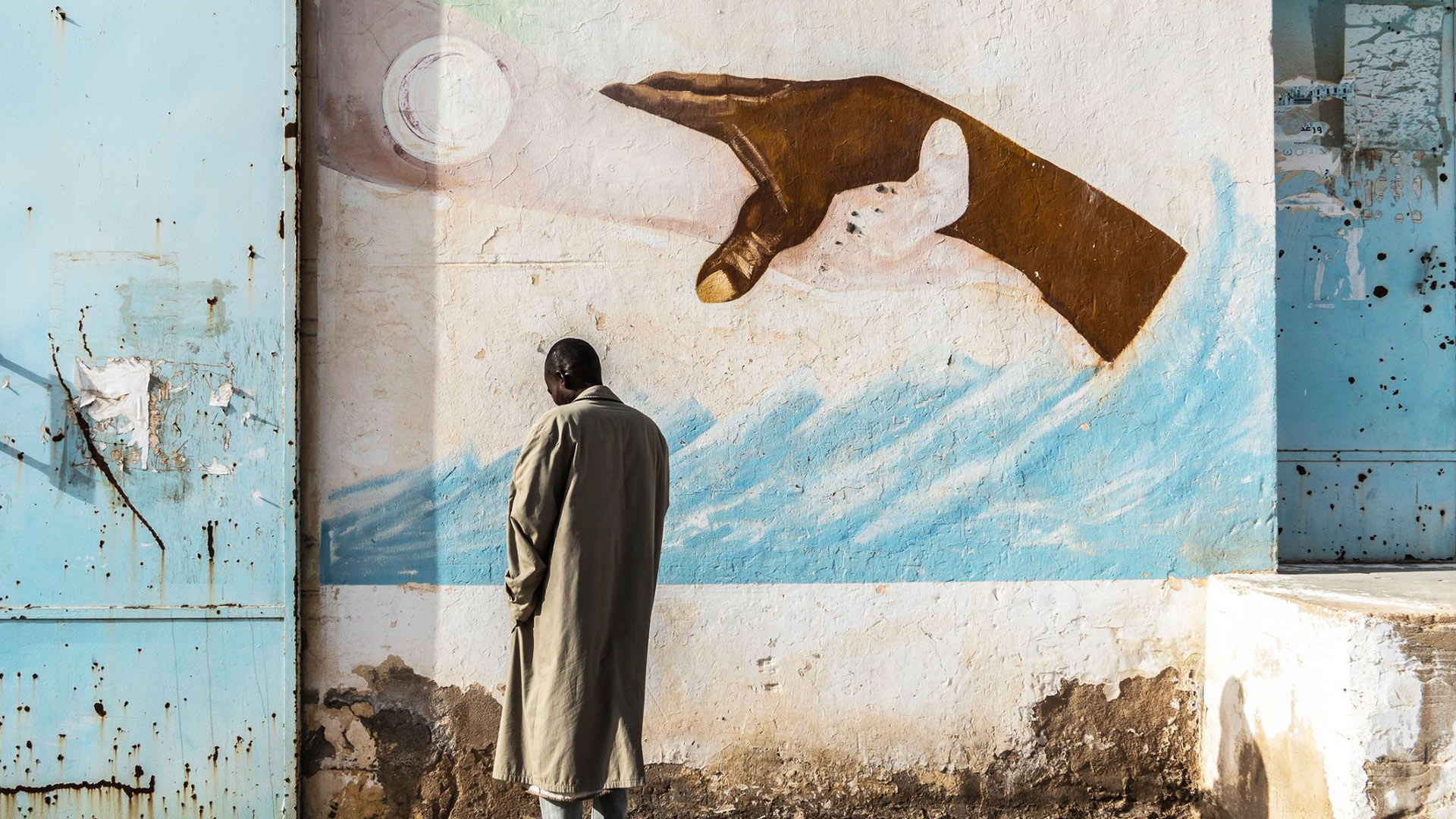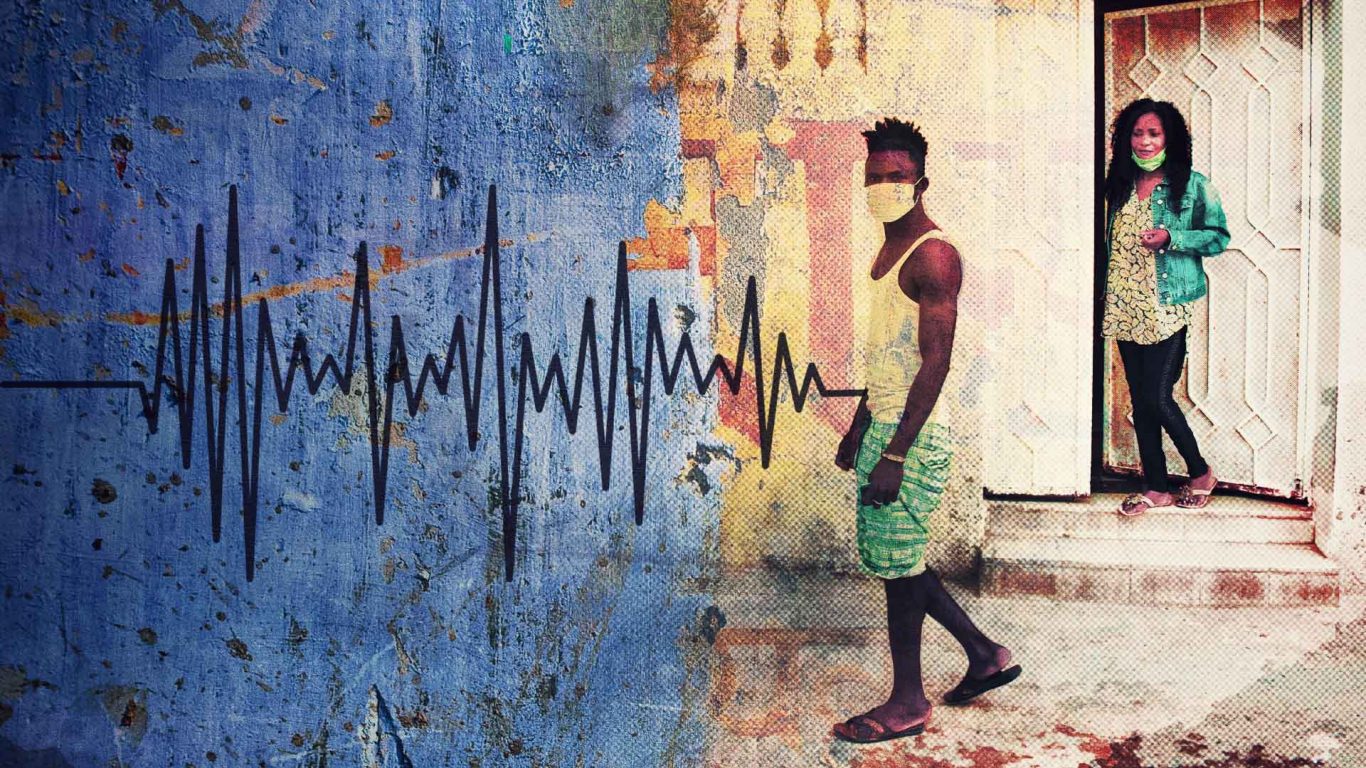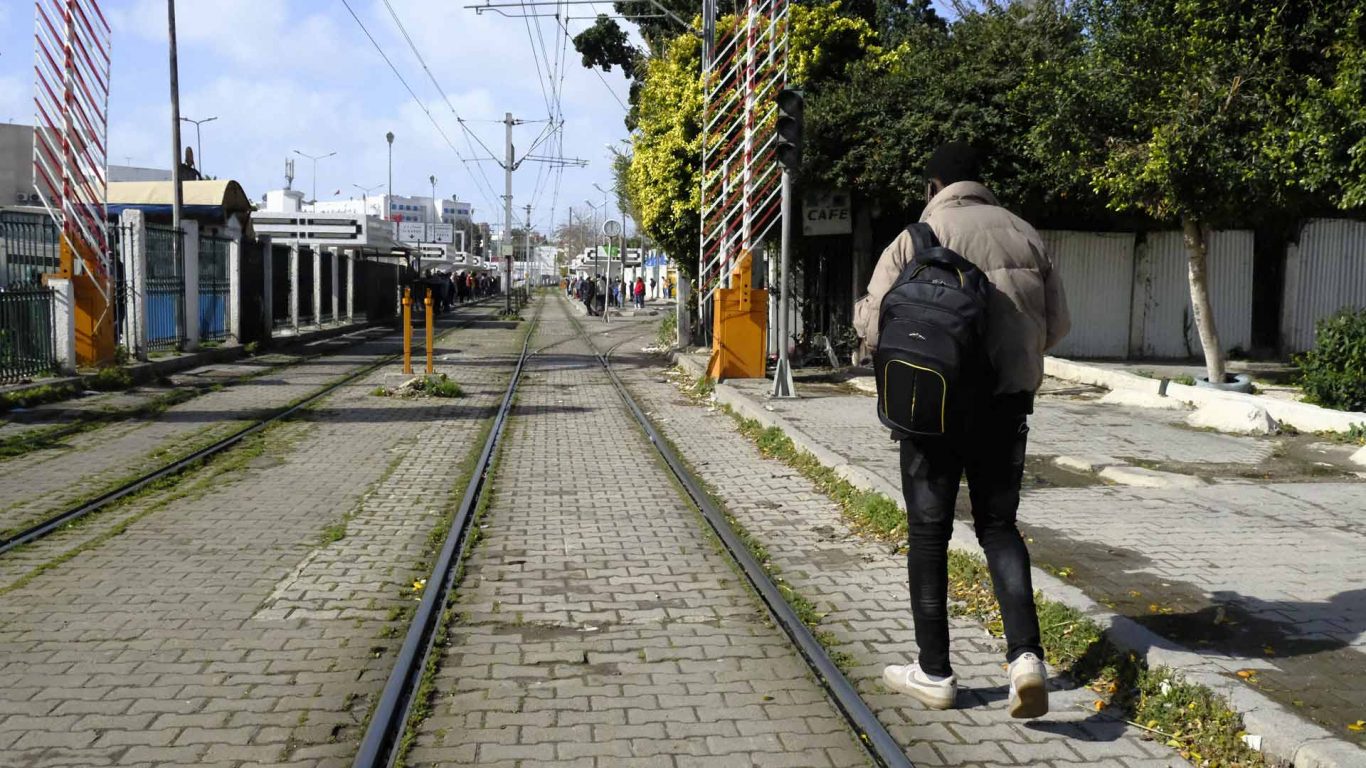Melissa is Ivorian. Ever since the Presidency's statement came out, she and her husband have been scared for their lives: they haven't left their home since Wednesday. The couple has been spending the day in the living room and keeping their curtains drawn. Their child, a three-year-old boy, has stopped going to daycare. "His teacher usually calls me when he doesn't show up, to check if he's sick or something," said Melissa. "It's been three days since he last went and she hasn't contacted me."
"She knows what's going on," Melissa states plainly.
Most of their relatives and neighbors have found themselves in the same situation. A racist campaign targeting sub-Saharans in Tunisia has been steadily gaining momentum for several months. The President himself has supported these racist and conspiracy theories and accused sub-Saharan Africans of being "hordes". He also stated that sub-Saharan immigration is a "criminal enterprise" aimed at "changing Tunisia's demographic composition". This has led to an upsurge in aggressions, arrests, and deportations, and has left thousands of sub-Saharans fearing for their lives and their future in Tunisia.
Mass deportations
Melissa's neighbor, Anna, an Ivorian young woman, is hosting her friends Issa and Pierre. The latter was recently evicted from his home by his landlady. Some bags and totes with his belongings are piled up in a corner of the living room.
Others are not fortunate enough to have people they can lean on. Mariam and her husband have been sleeping under a bridge for two days. Some thick plastic bags filled with their belongings are piled up in front of the Côte d’Ivoire Embassy. "This is all we have," lamented Mariam.
The couple's landlord kicked them out because he was scared he would be punished for housing sub-Saharan Africans. "Everyone is frightened," said Patricia Gnahoré, a journalist with RLF (Radio Libre Francophone) in Tunisia for four years. The reporter stated that the evictions started around February 9, when alarmist messages began circulating on social networks: landlords would be facing fines and prison sentences if they housed undocumented Sub-Saharans*. "So every landlord started evicting people with a two-week notice, just like that," continued Patricia.
"People you used to talk to and got along with, suddenly tell you to leave their house, without a care in the world."
Patricia has been receiving an endless stream of calls for help from the Sub-Saharan community over the past two weeks as a result of the sudden wave of evictions. "The landlords open the doors and throw the luggage out. The more tolerant ones come and talk to you and just tell you to leave," she sighed. The journalist has been taking in those who have been kicked out and trying to negotiate with their landlords to delay the eviction, "until the end of the month, the time to get their things together and find a place," she hoped.
Anna is able to stay in her home for now and accommodate her friends in need. "The landlord didn't bother us. But we'll need to pay the rent and the bills", worried the young lady. Just a few hours later, her landlord contacted her and gave her three days to pay the electricity bill or she would be evicted. Thanks to friends and a network of associations, Anna will be able to pay the bill. "But what about those who don't have any help?", the young woman wondered.
On the same subject
All those interviewed by inkyfada said they had lost their jobs. Anna used to work as a housekeeper, but she doesn't dare to leave her house anymore, given the news about assaults and arrests. Her roommate, Dylan, has been fired from the restaurant where he works, "for now”.
He was the only one of his friends who didn't stay inside that day: he went to see his former boss, in the hope of getting his salary. "His colleagues were taken away from their place of work [the kitchens of a restaurant]," recounted Anna. Luckily, Dylan was not there when the police showed up. However, his employer called him and told him not to come to work "until things settle down”.
Samia, another Ivorian woman who has been living in Tunisia for ten years, watched as her colleague was arrested before her eyes. "The police came, saw him, and took him away, just like that". By some miracle, the officers didn't seem to notice Samia, who froze in a corner, shocked by the scene. She went straight home afterwards, and locked herself in with her daughter. The latter hasn't been to school since. "Even though she was born here and speaks Tunisian", commented Samia.
"We're going to chase you all out of here"
Melissa, Issa, Samia and thousands of others have been wary about going out because of the many arrests and assaults on sub-Saharan Africans that they have heard about over the past few days. Melissa herself was verbally assaulted on the street.
"I was walking home, and a woman came up to me on the street. She motioned for me to take off my headphones. I thought she was going to ask me something," Melissa said. The woman first asked her if she spoke French and then started insulting her.
"She told me: 'We're going to chase you and all the others out of here! We don't want your kind here anymore, it's war now," reported Melissa, deeply shaken by the aggression.
"We face discrimination on a daily basis, but it's the rapid, explosive rise of this phenomenon that really surprises me," said Patricia of RLF.
Several associations have reported that the assaults were becoming more violent and even physical. Testimonies of people who have been chased down, attacked, and even injured with knives have been circulating for several days. In the suburbs of Tunis, a group of Sub-Saharan Africans have been attacked by young Tunisians who have broken down their doors and set fire to their building. Houses were ransacked. "They started surrounding the houses, setting fires under the buildings housing black people, some of whom had their doors kicked in. Some women were really scared," Patricia described.
Based on the testimonies, the police officers' attitude has not helped to contain the violence. "The police come but as soon as they leave, the young people come back to attack the building where our students live and set it on fire", reported the AESAT (Association of African Students and Trainees in Tunisia) on its Facebook page.
The police threat
Police also appear as a threat. The number of arrests is on the rise and many photos of "missing" people are being shared on social networks. One reportedly disappeared at the bank, another went to the police station to renew their papers and never came back... Pierre has no news of his sister, who was arrested at her place of work.
Testimonies and information collected by associations indicate that several hundred* people have been arrested in just two weeks, even before the Presidential statement was released.
Marc said that he was arrested in December 2022. On December 18, at a police checkpoint in Place de Barcelone, officers approached him and asked for his papers. Marc has a residence permit, but that day he only had his consular card on him. "It's the one the embassy gives us. I tried to show it to them, but they said they didn't know anything about it." Marc was immediately arrested and taken to a police station.
He wasn't the only one there: "There were 56 people, including women, some with their babies," he recalled. All of them are of sub-Saharan origin. They were loaded into a vehicle. The young man was confused. "You're inside, you don't know where you're going, everything is so dark," he described. The van took them to another police station to get fingerprinted.
This process takes hours. Marc managed to remain calm despite the humiliation inflicted on him by the police.
"They gave us food and as we ate, they started filming us, making fun of us. I didn't eat for a whole day because of that. I thought 'I'd rather starve than be filmed while I'm eating’. I just couldn't do it”.
In the end, Marc and the others were taken to Bouchoucha. He spent a total of three days in the detention center, with no idea of what was going to happen to him. The young man recalled that he was arrested during the World Cup. "I was there during the World Cup final. I didn't get to watch it," he chuckled.
By the third day, Marc finally found a French-speaking lawyer to represent him before the judge. He was granted a provisional release, just enough time to go home and get his residence permit to prove his legal presence in Tunisia. The ordeal was over, but the experience has taken its toll on him. In his four years in Tunisia, this was the first time he’d ever been treated like this.
"Checks yes, you get checked from time to time, but to get arrested, even when you have your papers? I've never seen that here”.
In light of the current aggressions, Marc believes that his Embassy is the only place where he feels "safe", despite his legal status. Since he posted about his experience on social media, he said he has been receiving threats. Because of the waves of mass arrests and arbitrary violence, he no longer dares to leave his neighborhood, except to get something to eat.
He also believes that if anything were to happen to him, the authorities wouldn't care.
"It was [already] like that, but we used to feel somewhat safe because the State was there, the police were there. Now, it's the State that abandons you, just like that. We're at the mercy of everyone."
The false argument of illegality
On February 25, three days following the release of the Presidential statement, the Minister of Foreign Affairs, Migration and Tunisians Abroad, Nabil Ammar, asserted that Tunisia was primarily fighting against "illegal migration, which is problematic in all countries”.
Except that in the case of Tunisia, this distinction between legal and illegal migration is "artificial", argued Camille Cassarini, a researcher on African migration in Tunisia at the University of Genoa. "The Tunisian State has never established the legal, technical and administrative conditions for granting Sub-Saharan Africans residence permits. This has always been a reality, since Ben Ali's regime," he said.
"This is not about people who put themselves in an irregular situation, it's about a State that didn't regulate their presence in it".
Camille Cassarini also noted that these practices are limited to Sub-Saharan Africans, and that these challenges are much less problematic for Europeans. "Even Sub-Saharan Africans who have all the necessary documentation never receive a permanent residence permit," he stated.
Anna's experience shows that this information is not always clear to the general public. A few days ago, she went to her usual grocery store to do some shopping. "After a while, he looked at me and asked whether I had a residence permit".
Anna said no. "You have to get one then!" he replied in a scornful tone. But she, like many other Sub-Saharan Africans, has been trying to gain legal status in the country for a long time, since her arrival in 2016. But she was quickly discouraged by the impossibility of getting papers, and therefore of working legally and traveling. She has since been paralyzed by the penalties she must pay, which have reached the 3000 dinar cap. She hasn't been able to see her daughters, who have remained in Côte d’Ivoire for the past six years.
"They don't know anything about our lives," said a regretful Anna.
On the same subject
"To get a residence permit, I need a job and housing. To have a job and housing, I need a residence permit," Pierre summarized. "What's the point?". Pierre works several days a week on a construction site, as a scrap metal worker. Faced with pressure, his employer told him that he had to bring his residence permit if he wanted to continue working. "If I had a residence permit, do you really think I'd choose to work on a construction site?" said Pierre ironically. "We are well aware that we get paid much less than Tunisians, but we have no other choice," added Issa.
A violent campaign
In the Côte d'Ivoire Embassy's waiting room, the air is heavy. Although dozens of people were there, the room was rather quiet. A steady stream of Ivorians lined up to register on census lists, hoping to be repatriated as soon as possible. Outside, large groups are waiting for their turn in front of the building or hurrying to the local bookstores to make copies of their identity documents.
Jean-Bedel Gnablé, President of ASSIVAT (Association of Active Ivorians in Tunisia), believes that the current psychosis is the orchestrated result of a racist campaign initiated by the Tunisian Nationalist Party: "For the past three or four months, Tunisian cyber-activists have been making hate speeches and spreading propaganda in order to kick sub-Saharans out of Tunisia," he explained.
For months, the Tunisian Nationalist Party, whose internal organization remains highly ambiguous, has been spewing racist rhetoric against Sub-Saharan migrants in Tunisia on social networks - mainly Facebook and Tiktok. The group has even created an online petition to repeal Law 50, which was passed the same year to punish all forms of racism and discrimination in the country. The Presidency's statement strongly echoed the Nationalist Party's racist rhetoric and seemed to further fuel the wave of violence in Tunisia.
"There have always been arbitrary arrests (...). It's always been a reality in Tunisia," commented researcher Camille Cassarini.
"But this time they have reached the State's discourse, it has become politicized. That's new".
"The political discourse is somewhat of an excuse for Tunisians to commit certain criminal acts and we've seen this within the community, because some of our compatriots have been assaulted," lamented Jean-Bedel, "we've made the connection between this hateful speech and the Presidential statement."
All those interviewed have no doubt that this campaign and the President's official discourse have led to uninhibited racism. Even when landlords do not plan to evict them, many fear that neighbors would report them. "The police came to talk to my landlord," Melissa said, "the neighbors were the ones to tell them that she was housing Sub-Saharans. The landlady was very kind, she stood her ground”.
A young woman testified that she had taken in a Sub-Saharan woman who had been evicted from her home. Not even an hour after the woman's arrival, her landlord called her demanding an explanation. "I'm sure it was the neighbors. I had to negotiate with him until he finally agreed to let her stay for one night," she said.
Arrests and arbitrary violence have also put Black Tunisians in danger, leading them to be ever more vigilant. Several people have denounced the assault on a Black Tunisian activist in downtown Tunis.
"This problem has been around for a long time," said Chiheb, a young black Tunisian. You get insulted on the street all the time, and when you answer in Tunisian, they tell you: 'Oh, you're Tunisian, we don't have any black Tunisians, so I mistook you for a Sub-Saharan’”.
With the mounting violence, Chiheb admitted to being scared and doing everything he could to avoid being mistaken for a Sub-Saharan. "Sometimes I'd pretend to be on the phone with someone so that people would hear me speak in Tunisian. When I'm in a café, I intentionally speak loudly too" he gave as an example. "Usually, when I get checked by police officers and show my papers, they just let me go."
"In this case, the citizens are the problem, they're not going to ask for my papers, they're just going to attack me."
"We're really afraid that the Tunisian population would jump on the bandwagon", worried Issa, while recognizing that "it's already begun".
A call for protest against immigration on Sunday, February 26, 2023, has been circulated online. For some of those who commented on the posts on social networks, the purpose was to "make sure that black people will never feel safe again in this country [Tunisia]". Since Friday, February 24, the Party has called for the protest to be cancelled.
Yet, for Melissa, Samia, Anna and the others, the damage is already done. "We're just waiting. We don't know what’s waiting for us on Sunday, we're terrified. What else can we do but wait?", Melissa concluded.






